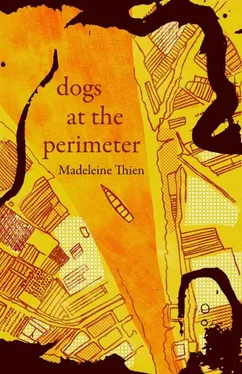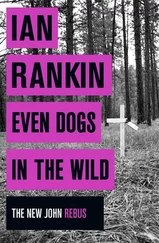“Why did they kill her?”
Chorn shakes his head, visibly upset. “I don’t know. Maybe she didn’t die. Don’t talk about this. Lower your voice.”
But then he reaches into his pocket and he takes out Sorya’s letters, five of them, creased and beginning to tear. He sets them on the floor and, for the first time, looks straight into James’s eyes.
“Why are you doing this?” James says. He is nauseated and the man is breaking apart in his vision.
“Let her go. The past is done.”
The man stands up and dust comes off him, it sticks to the air. James wonders why he doesn’t stand up, push Chorn backwards, crack the weight of his skull against the cement wall, spill this man’s life onto the once-elegant tiles, into the black water, go to be tortured and executed for a crime he can truly understand. His thoughts are viscous and slow. He could stand up now and find some strength, take this because there is nothing left to take. So what if Angkar is everywhere, he could kill this one man and be done with it here, he could choke his own weakness.
The door scrapes closed. James opens his eyes.
A shadow comes and sits in front of him and James can’t help himself, his head drops forward against his brother’s chest. He can feel the bones there, his brother is skinny, still a boy, but he is stronger and more complete than James will ever be. He cannot bring himself to touch the letters, they sit on the tiled floor too lightly. The ox-bell has stopped ringing and now a voice is speaking urgently. Prodding the animal forward. Hours pass. Days fall down, maybe it is a month that he sits like this, or just a few days, eating and sleeping and wasting away, remembering everything. Her watchful face, her scent, her hands pushing him back. No matter what the voice says, the animal won’t move. There is water everywhere, he cries until all the rest comes out, all of it spills onto his ragged shirt, onto the tiled floor, and seeps into the cracks that lead out of the store room. There is no wind in this room, no oxygen. Where is emptiness? No matter where he goes, he can’t find emptiness.
“Do you believe him?” Kwan asks.
James, wherever he is, trickling across the ground, spreading down to the lowest places, says no.
“No,” Kwan says. “Okay, James. Okay. Let go.”
“I can’t,
I can’t.
I can hear her.”
“Don’t listen.”
“I promised to bring her to the sea.”
“Let go, brother.”
“I promised her.”
“Let go.”

The last letter comes to him much later. He is standing at the Laos — Cambodia border and it is 1981, two years since the Khmer Rouge was defeated. In all that time, James, now known as Kwan — a mute, a smuggler, and a solitary man — has heard the most remarkable stories: the people who have been recovered, the strange ways in which children were protected, the objects returned to their owner’s hands. He hears them at each and every encounter, when he trades the sugar and salt he has carried on his back from Thailand. The stories are repeated so often, they change into fairy tales of the most devastating kind.
In 1980, he went back to their apartment on Monivong Boulevard. There was a family living there, one of those new Cambodian families consisting of orphans: a man and woman with someone else’s children, a friend turned uncle, a stray niece. They had traded everything of value in the apartment but they had held on to the photographs, without the frames, which they kept together in a blue plastic bag. Kwan gave them one precious U.S. dollar and came away with photos of Sorya and Dararith, and of James. The stray niece came running after him and asked if she could keep the plastic bag, so now the photos stay in his shirt pocket, held to the fabric with a paper clip.
Chorn was right. This is the city of before. Five-year-olds fending for themselves, and the Khmer Rouge, arrogant, shit-faced, still prideful in their stronghold in the north, still holding their seat at the United Nations and hobnobbing with the Western elite, conspiring to take it back. Phnom Penh is no longer the agitated city he remembers, no, the dial has ticked back and stripped the place of people and goods, it is a city now where the kids run naked, where people walk around with photographs of missing family, where, by accident, you step into a pile of bones, rinse your foot off, and then move on, where men and women dress in hothouse colours, clashing motifs, to push back the memory of black clothes and black hearts. Those barbarians had sawed off the hands of the ancient Buddhas and thrown them into the water, now the children fish them up and stack them on the riverside and try to sell them to the aid workers or the off-duty Vietnamese. Other, more terrible losses, come up from the mud.
He went to Kampot, riding on the back of a moped driven by a ten-year-old who had stolen it from who knows where. This ten-year-old is so wizened, he doesn’t smile or laugh or anything. He just names, matter-of-factly, the price, U.S. dollars or Thai baht, no other currency accepted. When the boy takes the cash in his bony fingers, he chews his lip and studies the bills, already assessing the things he has to buy. What a bombed-out ruin Kampot is now, buildings made unstable by the shelling, buildings that look like someone kicked them in the kneecaps, hard. In his youth, Kwan drove a lorry so he knows these roads well, but still it’s a shock to see the devastation and how the sea just keeps rolling in, unstoppable.
“Cigarettes,” the kid demands.
Kwan shakes his head.
“You can speak now,” the kid says abruptly. “Angkar is done. Finished.”
Kwan gestures that he can’t speak, he has never spoken.
The kid shrugs, folds the bills up, tucks them somewhere in his pants. “My name’s Joe,” he says, mangling the word. “You need anything, you ask for Joe.” He revs the accelerator, the engine hacks, and he wobbles away over the cracked street.
That night, sitting on a mound of stones, he hears someone playing music on a record player. A man calls out the name Sorya and he lifts his head and sees a thin woman dancing slowly, her wrists turning in the same way they must have done decades ago, when she was a girl and this was Indochina and the French swanned down the wide boulevards and hid their guilt in a veil of opium smoke. Khmer dance is its own language, this is what Dararith had once explained: “This gesture means you have come across a flower, a lotus, and you are offering it, and this gesture here means love. And this gesture is water.”
“Water, water, everywhere,” Sorya had said. “Come and dance with me, Dararith. Nothing so classical. Just the ramvong . Just the lindy hop.”
“Wait,” Dararith had said. “Let me take your photo.”
“Click away,” she said.
Here she is now, in his pocket.
He had felt, at the time, lonely: an outsider watching these two siblings, this self-sufficient love. But he knows now there are no outsiders. There is no walking away at the end, delusion has to finish somewhere, it has to end or else weakness will outlast them all. He has to commit to something or be done. From Kampot he travels to the prison where Chorn, too, was eventually arrested, eventually tortured and killed. In the storeroom where he passed nearly two years, boxes are rotting in the heat, files and pages, confusions, accusations. He went through them and found the sixth letter, the last one, the same thin weight of paper, but her handwriting had deteriorated, the pen had hardly any ink. Who was she writing to? Not James anymore, or not just James. They are throwing us away, she wrote, and I can’t understand why because all I wanted was for the war to end, no matter who won. I never admitted any allegiance. My name is Sorya. I am the sister of Dararith, the daughter of Kravann and Mary, the wife of James. I was a teacher . There was a biography and a confession, and in the biography was the name of their son, just as Chorn had told him. The prison file had dates, but no date of death, there was not even a photograph, there was no file for the baby, and he dared to believe that they had been absolved. That she wandered, like him, with a different name and a new soul.
Читать дальше













